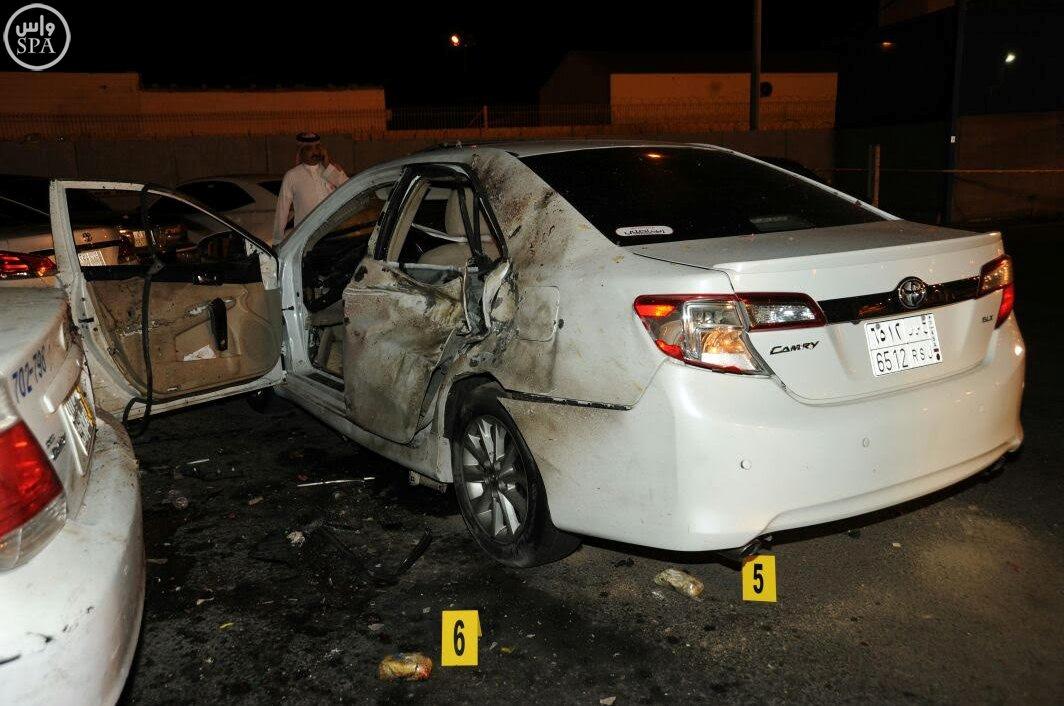A damaged car is seen after a blast near the U.S. consulate in Saudi Arabia's second city of Jeddah on Monday, July 4, 2016. On the same days, suicide bombers struck in the eastern Saudi city of Qatif and in the holy city of Medina.
A suicide bombing in the holy city of Medina in Saudi Arabia has sparked a new wave of condemnation of ISIS by Muslims worldwide.
ISIS didn’t claim immediate responsibility for the attack, which killed four security officers on Monday evening. But the group didn’t have to.
The attack that took place near the Mosque of the Prophet, one of the two holiest sites for Muslims worldwide, had the fingerprints of ISIS all over it, says Fahad Nazer.
“ISIS and its followers have been fairly clear in saying that Saudi Arabia is their ultimate prize,” Nazer says. “They’re doing everything they can to create a sense of instability.”
Nazer is a political analyst with the JTG Inc. consulting firm in Vienna, Virginia and a former analyst at the Saudi Embassy in Washington, DC.
“They certainly have tried to foment sectarian discord in Saudi Arabia by targeting the Shia minority in the eastern province, and I think they have largely failed.”
There are no red lines for ISIS, Nazer adds, even when it comes to killing fellow Muslims. The attack in Medina took place during the holiest days of the holy month of Ramadan and it killed four men who had reportedly invited the bomber to break the fast with them.
The reaction from Muslims on social media has been remarkable, says Hassan Hassan. He’s the author of “ISIS: Inside the Army of Terror.”
Attacking the place where the Prophet Muhammad is believed to be buried, “that was basically crossing the line,” Hassan says. “They were not even waiting for ISIS to claim responsibility. People immediately knew that this was the only group in the world that could do something like that.”
Hassan says one thing sets ISIS apart from al-Qaeda. “ISIS has declared war against Islam and against Muslims,” he says.
According to its ideology, Hassan says ISIS views anyone who refuses to pledge allegiance to the group as an apostate who can be killed. And that includes most Muslims, who make up the majority of the victims in ISIS-related attacks.
ISIS reportedly called on followers to carry out attacks especially during Ramadan.
The latest surge in violence could be due to the fact that ISIS is losing territory in Iraq and Syria. But eventually, the sheer brutality of its actions could become its undoing.
Hassan says its viciousness is fueling a movement of Muslims against ISIS and what it stands for.
“[It’s] a movement that rejects these ideas and maybe even engages in soul searching, [asking] where does this organization come from?” he says.
But Hassan adds that ISIS has proven itself to be resilient. He says it only takes small numbers of fanatics for the group to carry on and attract new recruits.
We want to hear your feedback so we can keep improving our website, theworld.org. Please fill out this quick survey and let us know your thoughts (your answers will be anonymous). Thanks for your time!
